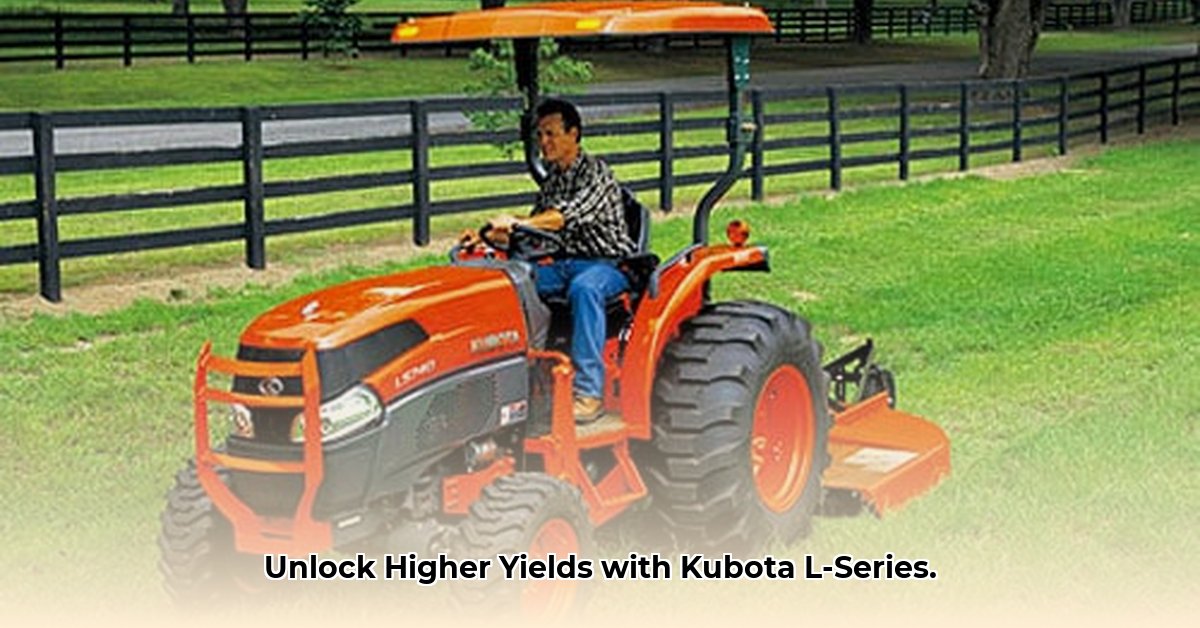
The agricultural landscape is evolving, demanding both higher yields and a lighter environmental footprint. Kubota's L-series tractors are stepping up to this challenge, offering farmers a powerful blend of efficiency and sustainability. These tractors aren't just about boosting profits; they're about building a healthier future for farming and the planet. This article explores how the L-series helps farmers achieve sustainable practices, from reducing fuel consumption and emissions to leveraging precision technologies for optimized resource use. For more in-depth analysis, check out this detailed review.
Fuel Efficiency and Reduced Emissions: A Greener Bottom Line
One of the most compelling aspects of the L-series is its remarkable fuel efficiency. This translates directly into lower operating costs for farmers, a significant benefit in today's market. But the environmental implications are equally impressive. Less fuel burned means fewer greenhouse gas emissions, contributing to a cleaner environment and a smaller carbon footprint. How much can you really save? Independent tests have shown fuel savings averaging 15-20% compared to previous models, a substantial reduction over the lifespan of the tractor. Furthermore, the L-series incorporates advanced emission control systems, significantly minimizing harmful pollutants released into the atmosphere. This commitment to reducing emissions makes the L-series attractive for farmers looking to minimize their overall environmental impact.
Precision Agriculture: Maximizing Resources, Minimizing Waste
Sustainable farming hinges on maximizing resource utilization and minimizing waste. The L-series excels in this area through its seamless integration with precision agriculture technologies. GPS guidance and auto-steer systems allow for pinpoint accuracy in tasks such as planting, fertilizing, and spraying. This level of control reduces overlaps, eliminates waste from over-application, and optimizes input usage. Think about it: instead of broadly scattering fertilizer across an entire field, farmers can precisely target areas needing nutrients. This precision not only saves money but also protects water quality and promotes soil health by preventing the runoff of excess chemicals. This precision farming approach results in a more sustainable farming method.
Versatility and Adaptability: Meeting Diverse Farming Needs
The L-series tractors are designed for versatility, capable of handling a wide range of tasks throughout the farming cycle. From soil preparation to planting, crop maintenance, and harvesting, these tractors offer the adaptability required for diverse farming operations. Their maneuverability is a key advantage, reducing soil compaction—a significant concern for sustainable soil health. This reduced soil compaction promotes better water infiltration, reduces erosion, and ultimately leads to a healthier and more productive farming environment. The versatility of the L-series allows farmers to implement sustainable practices like reduced tillage, which minimizes soil disturbance and preserves soil structure.
A Farmer's Perspective: Real-World Success with Sustainable Practices
"The switch to the L-series Kubota has been a game-changer," says John Miller, owner of Miller Family Farms in Iowa. "The fuel efficiency alone has been significant, but the precision farming capabilities have really elevated our operation. We're using less fertilizer and pesticides, and our yields are higher than ever before. It's a win-win for both our bottom line and the environment." Miller's experience underscores the tangible benefits of employing L-series tractors within a sustainable farming framework. His story highlights the real-world impact of embracing innovative technology for sustainable agricultural practices.
Comparing the L-Series: A Smart Investment for Sustainable Farming
While various competitors offer tractors with certain sustainable features, the L-series distinguishes itself through a thoughtful balance of robust build quality, reliable performance, and competitive pricing. The return on investment is significant, especially considering the long-term savings achieved through reduced fuel consumption, minimized resource waste, and enhanced yields. The user-friendly interface of the integrated technology also enhances its appeal. When comparing cost and efficiency, the L-Series Kubota stands out as a solid and sustainable choice.
The Future of Sustainable Farming: Data-Driven Decisions
The L-series is more than just a tractor; it's a platform for data-driven decision-making. Its seamless integration with various data collection tools allows farmers to gather crucial information on crop health, soil conditions, and other factors impacting yield. This data empowers farmers to optimize resource utilization, proactively address potential issues, and make informed decisions leading to enhanced efficiency and sustainability. The ability to collect, analyze, and utilize data will continue to be pivotal for the future of farming. The L-series helps to pave the way for this advanced data utilization.
Conclusion: Embracing Sustainability, Enhancing Productivity
Kubota’s L-series tractors represent a significant leap forward in sustainable agriculture. Their fuel efficiency, precision capabilities, and adaptability provide farmers with the tools necessary to optimize resource use, minimize environmental impact, and simultaneously enhance productivity and profitability. They are not simply machines; they are an investment in a more sustainable, efficient, and prosperous future for farming.